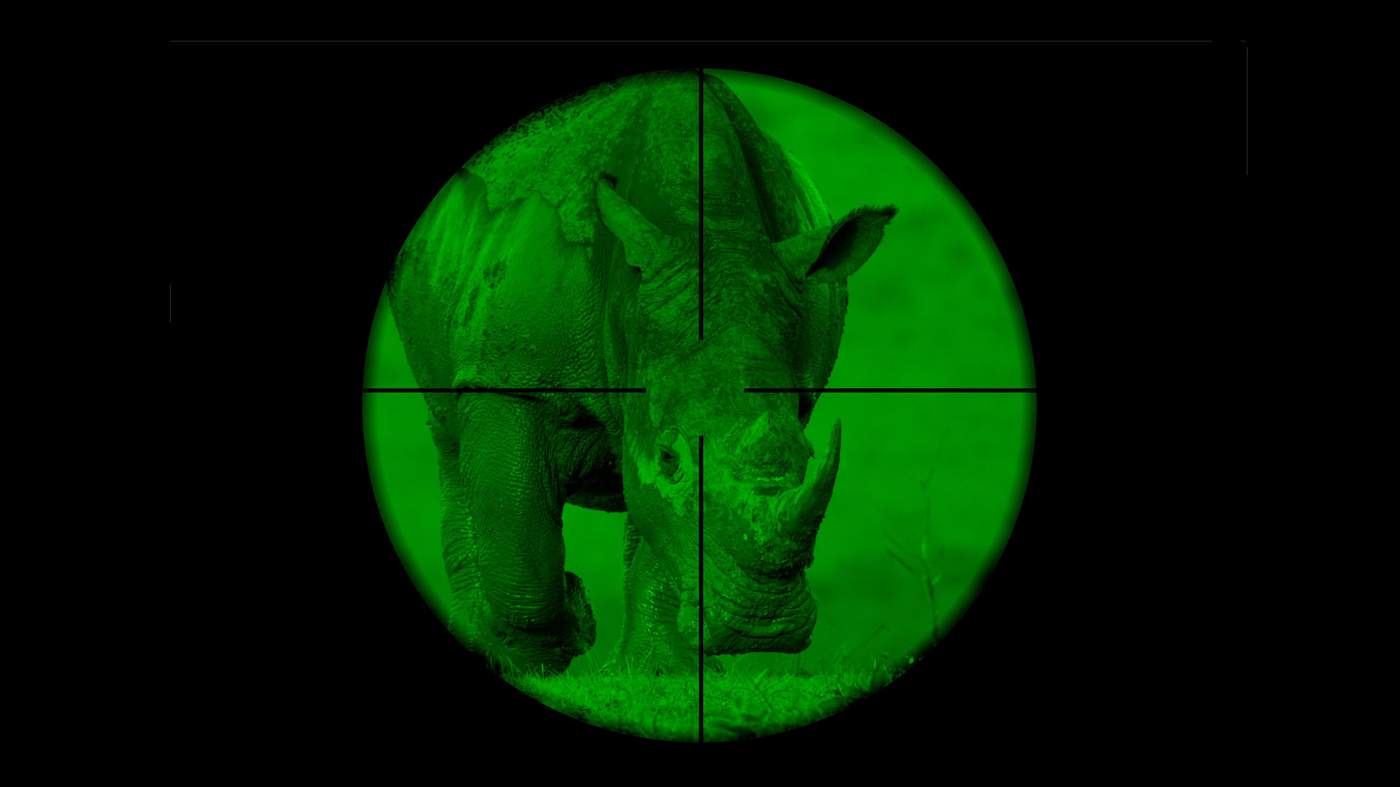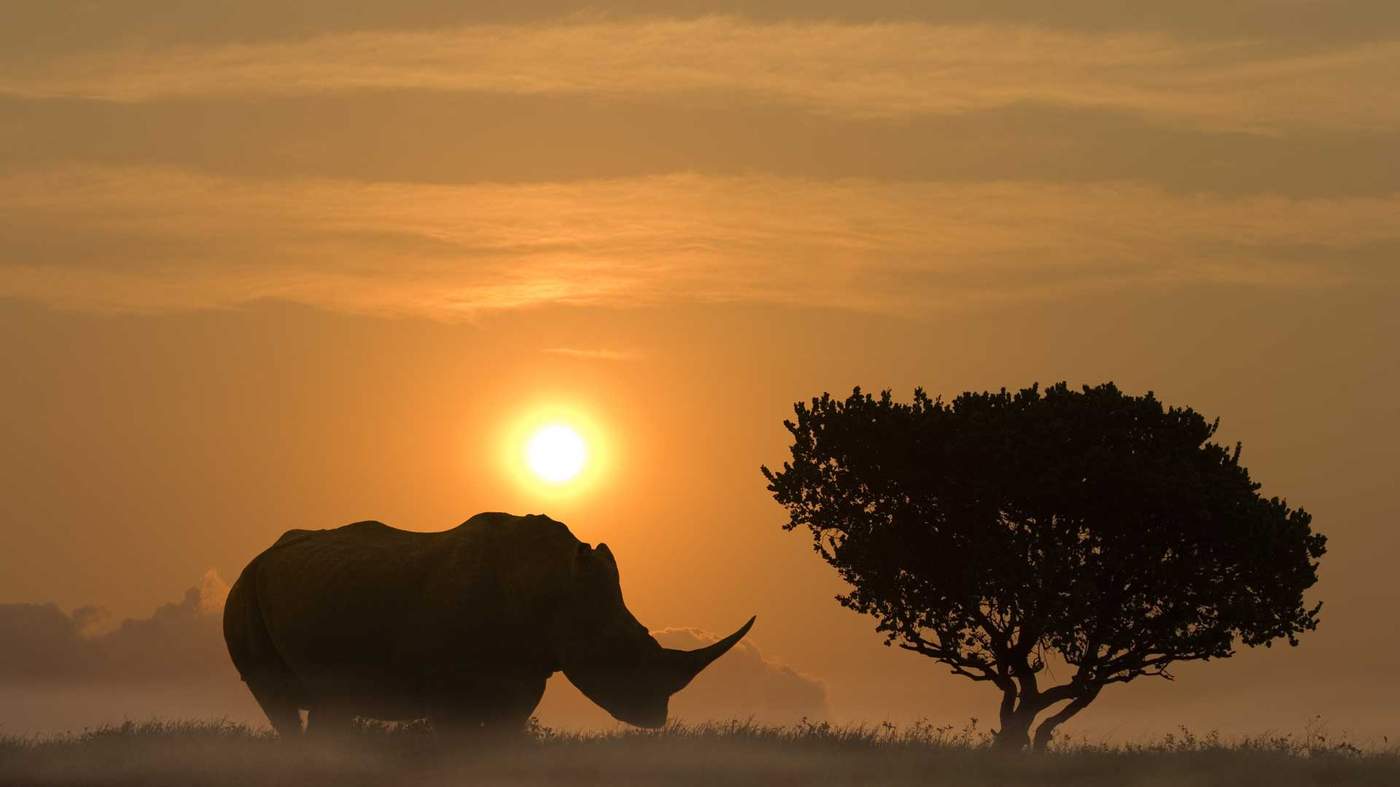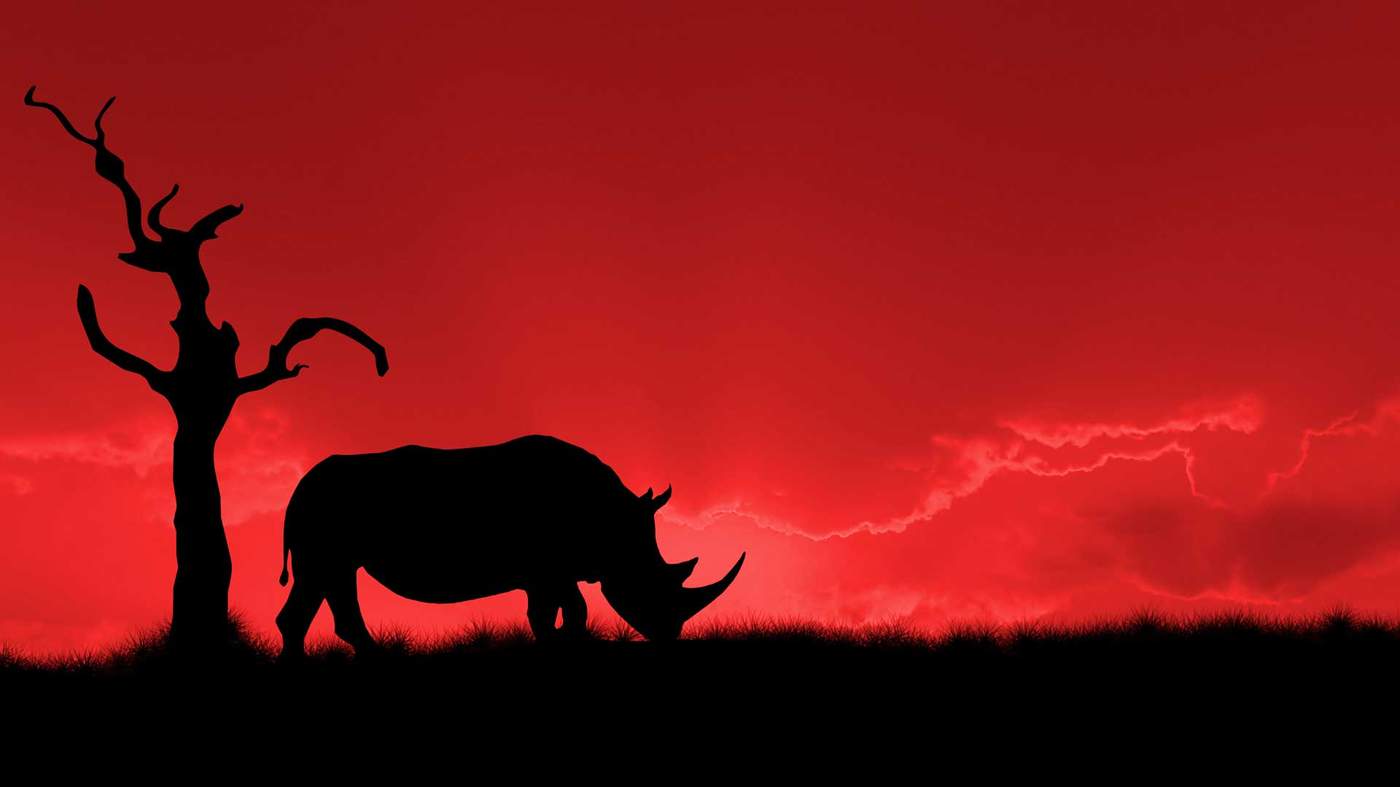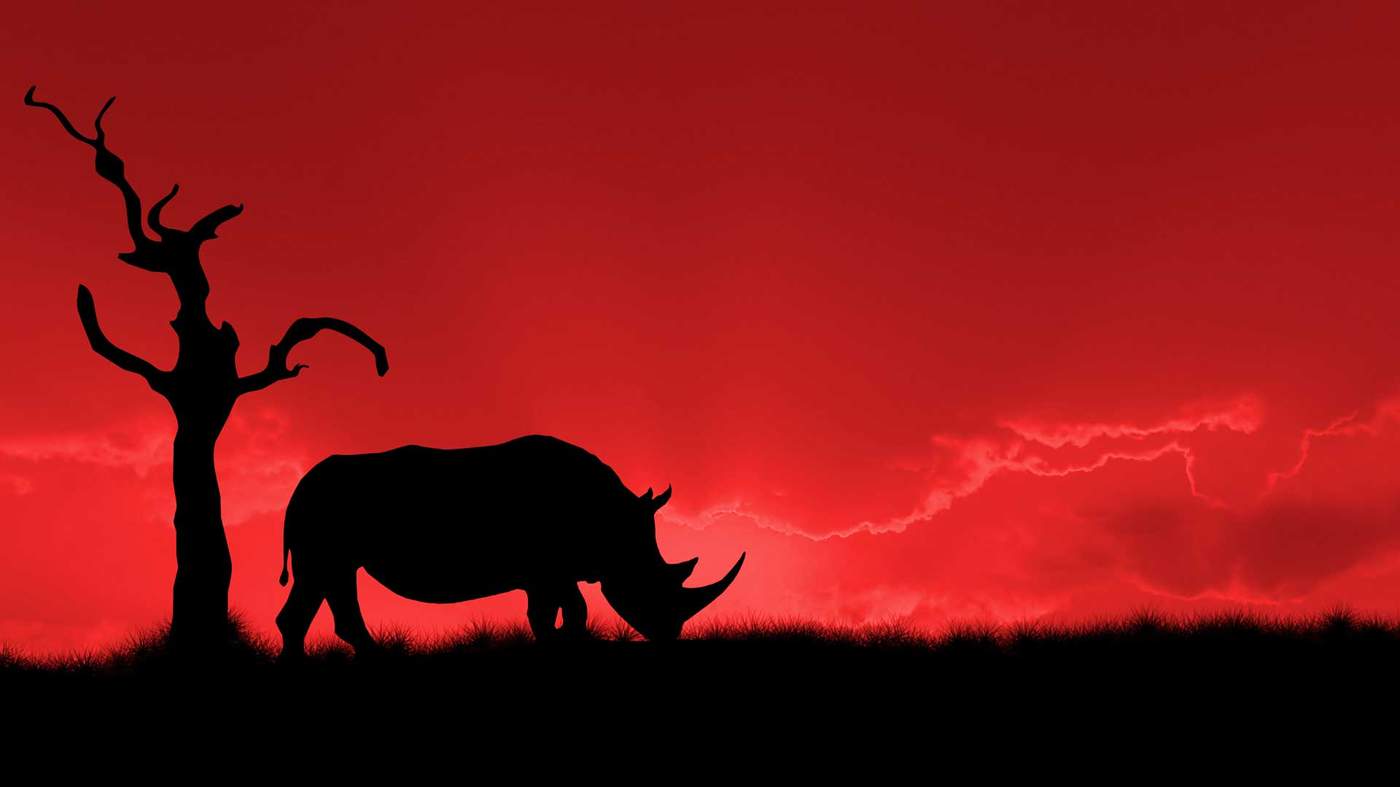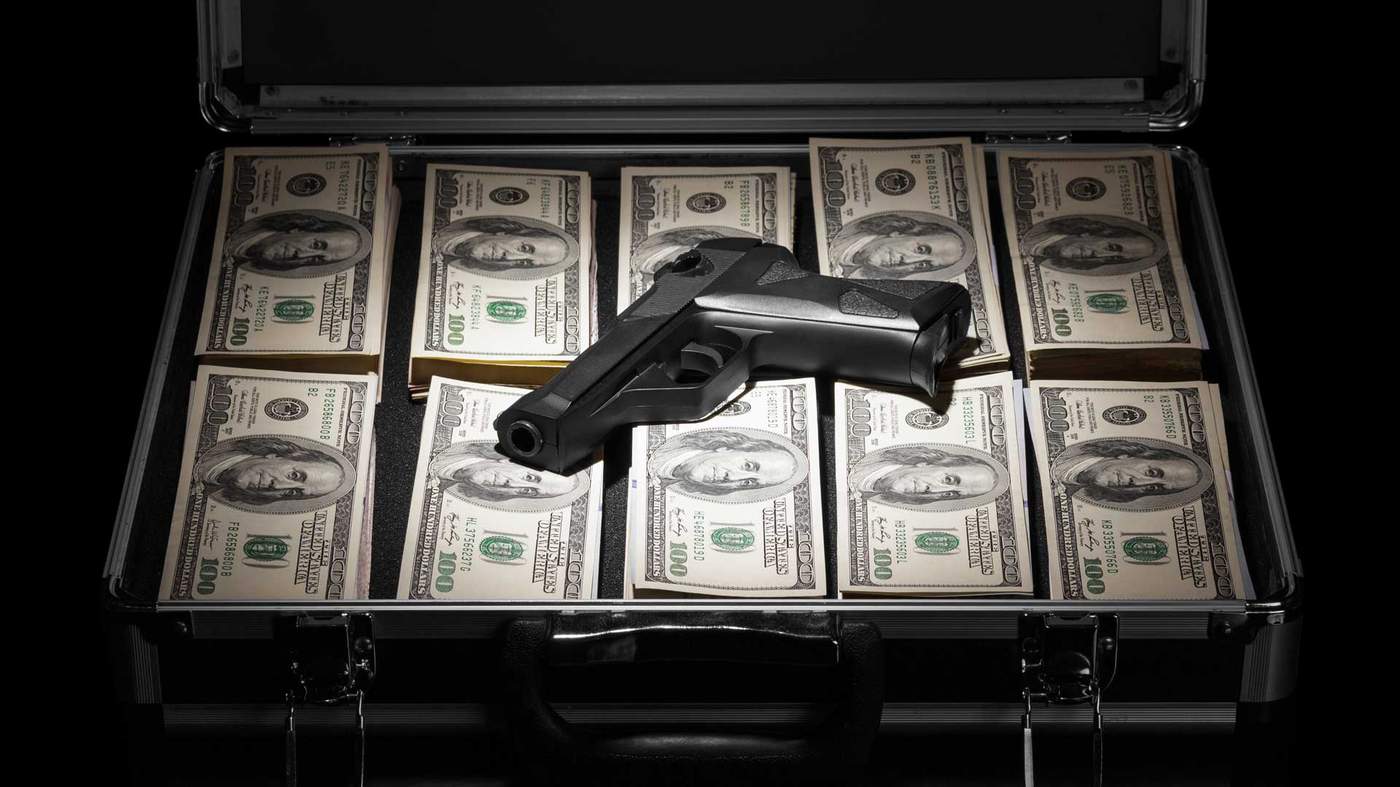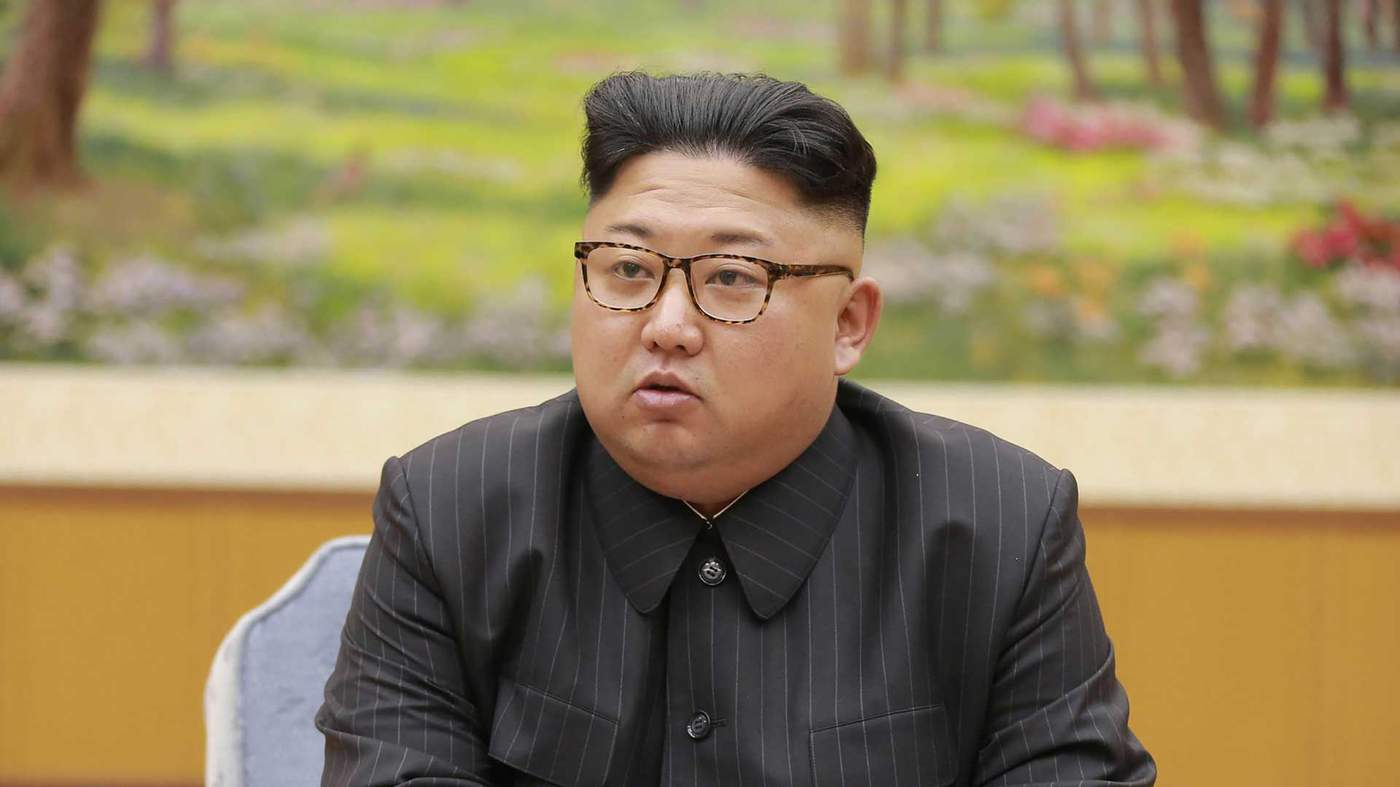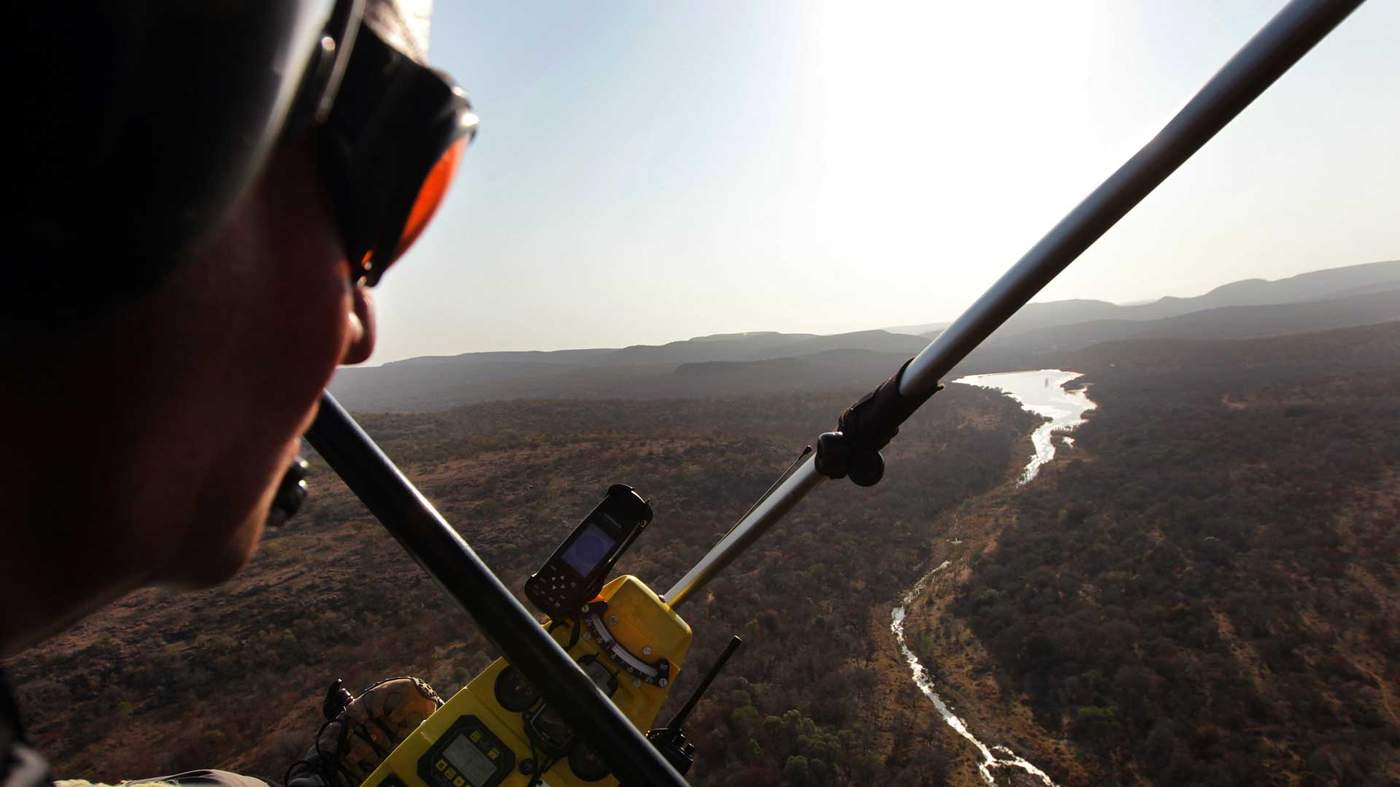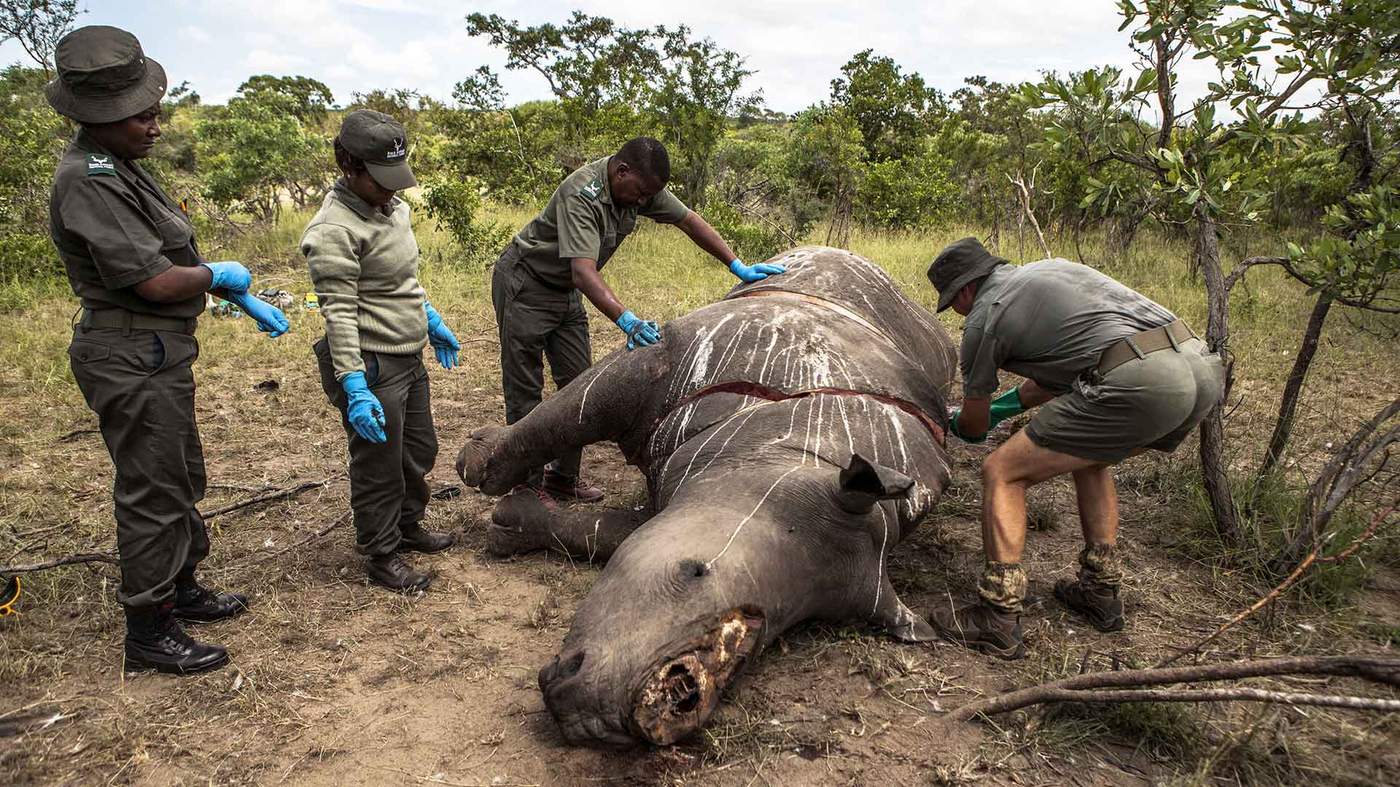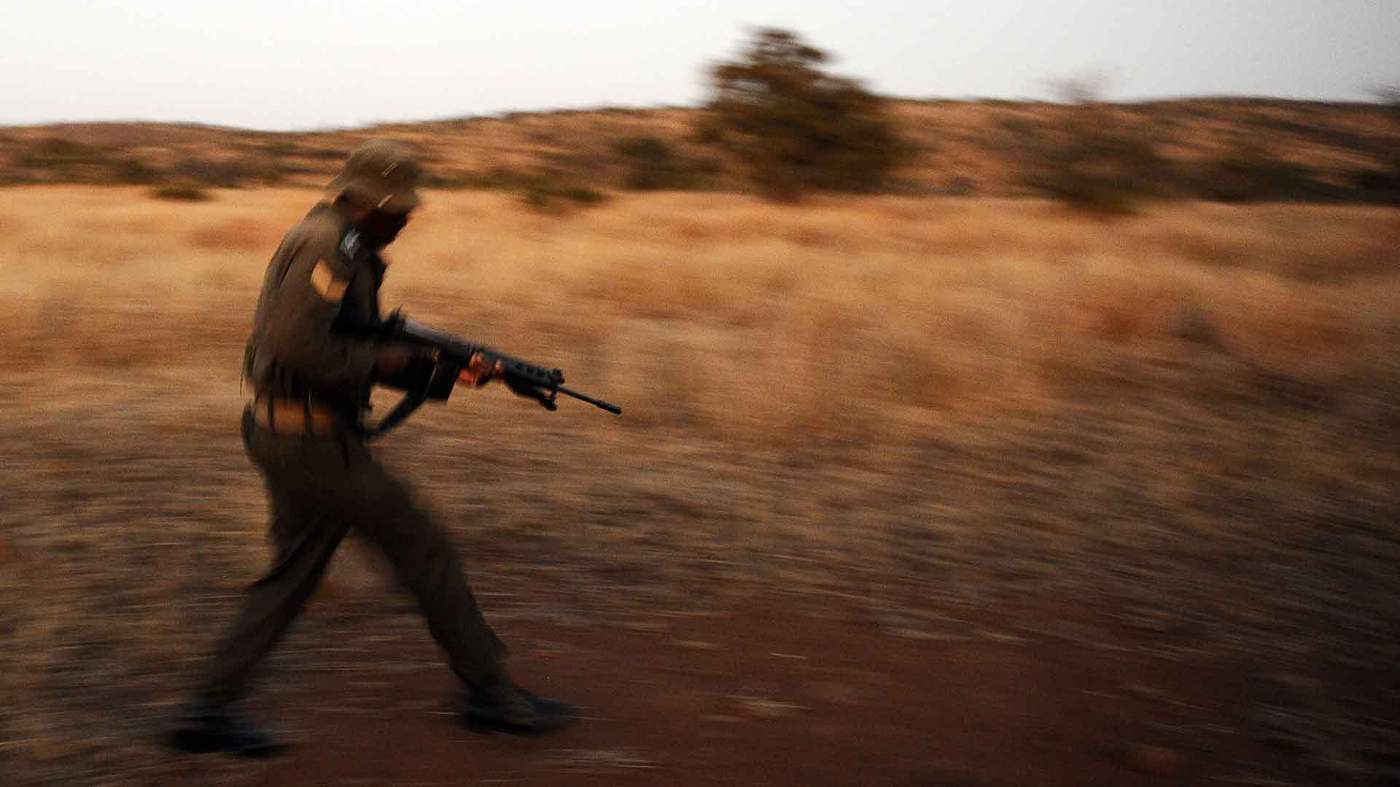These are just some of the characters involved in a complex smuggling racket that is almost impossible to police because it crosses so many borders and involves countless criminals.
Between 2007-14, rhino poaching rose 9000%. The very existence of the species is threatened by organised crime.
Warning: This piece contains images that may be upsetting to some people.
Rhino poaching networks are typical of the structure of the new mafias in the global marketplace.
The term mafia used to conjure up images of Marlon Brando as Don Corleone in The Godfather, or Tony Soprano as the head of the mob in New Jersey. But in the early 1990s, mafias started to adapt to the new era of globalisation.
And just as multinational corporations are often opaque, spreading their operations across many territories and tax havens with complex supply lines, so too are the new mafias.
I started researching the rise of this new form of transnational organised crime 14 years ago. During my travels around the globe talking to criminals and law enforcement officials, I realised how new mafias often operate like franchises.

James Norton stars in , the drama based on Misha Glenny's 2008 non-fiction book exploring global crime networks. The series is on Sunday at 21:00 GMT on ����ý One.
Mark Galeotti, an expert on transnational crime and security in Russia, explained how it worked. One of the most powerful organised crime groups in Moscow was the Chechen mafia, many of whose members hailed from the lawless Russian republic of Chechnya.
“The Chechen mafia became a brand name, a franchise - McMafia if you like,” he explained. “They would sell the moniker ‘Chechen’ to protection rackets in other towns provided they paid, of course, and provided they always carried out their word. If a group claimed a Chechen connection, but didn’t carry out its threats to the letter, it was devaluing the brand. The original Chechens would come after them.”
This model started in Russia in the 1990s but it has now spread around the world across a range of criminal enterprises - everything from the Colombian drug cartels to Vietnamese groups trading in endangered wildlife species.
And then you have the emergence of the “mafia state” - a country run by and for a powerful clique or network of corrupt politicians and state intelligence officials with close links to organised criminal networks.
Russia under Vladimir Putin has often been accused of this.
So has North Korea.
In the case of Kim Jong-un’s regime, it’s because North Korea can’t or won’t integrate into the global financial system. As long as sanctions continue against Pyongyang, the only way it can obtain hard currency is through nefarious means.
In 2015, police in the Mozambican capital, Maputo, arrested a group of men and confiscated rhino horn, a large sum of dollars, a small amount of local currency, and, rather strangely, four sacks of rice.
Two of the arrested men were North Koreans who claimed to be diplomats based in South Africa. Their bail was set at $30,000, which they deposited before promptly fleeing the country.
A number of North Korea’s African embassies form a nexus of illicit trade in rhino horn, cigarettes and minerals”
The investigative reporter Julian Rademeyer spotted a news report about the arrests and started delving deeper, eventually publishing the landmark study .
When I visited Rademeyer in Johannesburg, I was shocked to hear about the extent of North Korea’s involvement in the trade as he had detailed in his report.
“A number of North Korea’s African embassies form a nexus of illicit trade in rhino horn, cigarettes and minerals,” he wrote.
Rademeyer explains further “that the diplomats are working under the auspices of Bureau 38, a shadowy government department whose sole purpose is to accrue hard currency”.
He also predicted that: “Increasingly stringent economic sanctions designed to cripple North Korea’s nuclear weapons capabilities will likely fuel the expansion of the regime’s illicit activities and state-sponsored criminal networks.”
The average ambassadorial salary in the North Korean foreign service is about $1,000 (£740) a month, which in most capitals is not enough to live on. So, in addition to finding hard currency for their bosses in Pyongyang, they have a huge incentive to add to their own salaries.
Over time, North Korean diplomats have been busted for selling untaxed alcohol and cigarettes, for dealing heroin and methamphetamines, and for trafficking women for sexual purposes. South Korea estimates that trade in illicit goods and services provides North Korea with revenues of almost $1bn a year.
In 2006, defectors from North Korea made the unexpected claim that the late dictator, Kim Jong-il, had decided to end his country’s engagement in the narcotics trade.
Apparently, he felt the trade was damaging his country’s reputation unduly. That’s one theory. The other is that the government in Beijing was concerned about the rising rates of drug addiction in China and applied pressure accordingly.
An end to drug trafficking meant that the diplomats could no longer meet their financial obligations by, say, smuggling 3,000 tabs of amphetamines in a diplomatic bag.
That was when North Koreans based in Africa spotted a market opportunity. The rising wealth of the Chinese and Vietnamese middle classes was reviving demand for rhino horn.
Back in the early 2000s, rhino horn didn’t feature on the list of illicit goods and services favoured by the new transnational crime gangs. They were more likely to be selling women, drugs and arms.
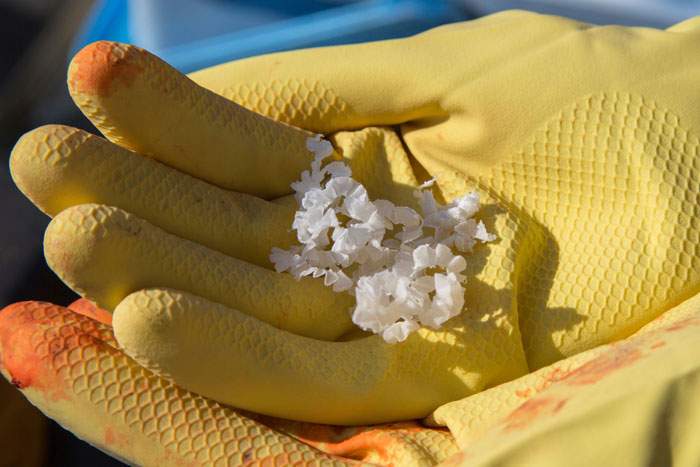
Rhino horn shavings
In the two decades before 2008, authorities in southern Africa as well as in China and Yemen, the two most important markets, appeared to have successfully eradicated most of the trade in rhino horn as well as in ivory.
But rhino horn . Powdered horn has been used in traditional Chinese medicine (TCM) for more than four millennia.
Carved into hilts for traditional daggers known as jambiyas, rhino horn was also in high demand in Yemen during the 1970s and 1980s. Small pockets of demand remain but buyers cannot compete with the high prices offered in south-east Asia.
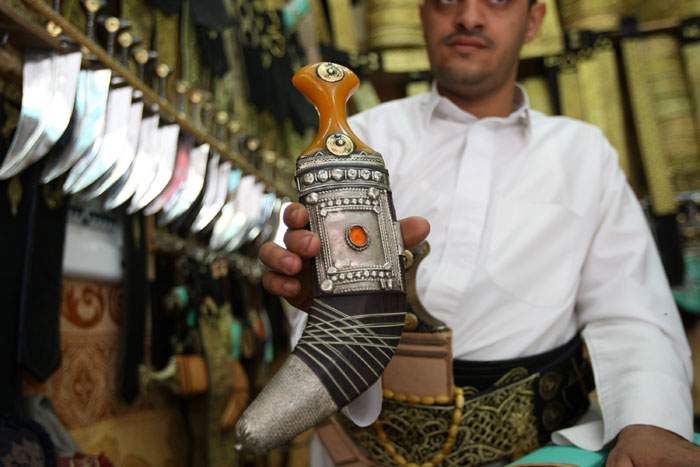
Rhino horn is often used in the hilt of traditional Yemeni daggers known as jambiyas
Numbers of both rhinos and elephants were growing at a healthy pace and the threat to some species had been downgraded by Cites, the global regulator for endangered wildlife. But in 2008, the number of rhinos slaughtered for their horns suddenly began to shoot up at .
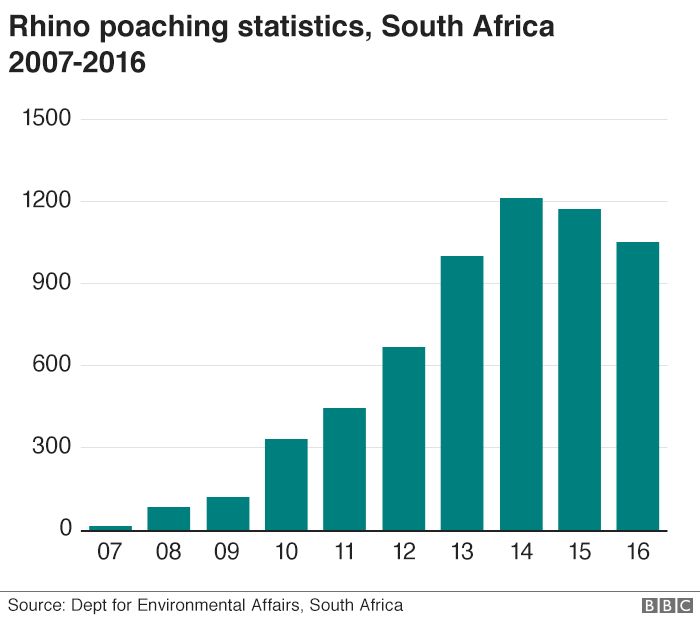
Rhino horn is now more valuable than cocaine, heroin or gold. Depending on where it is sold, the horn can fetch between $25,000 and $60,000 per kilo. The profits in this trade are phenomenal.
The nexus of impoverished Africans and corrupt officials working in tandem with East Asian criminals and spies poses a particular problem to traditional law enforcement and requires huge amounts of resources that most African states don’t possess.
“Big Joe” Nyalunga is currently awaiting trial with a group of other defendants on . Big Joe is a former South African police inspector so he is familiar with the legal system.
He was arrested as far back as December 2012 but for much of the time since he has been out on bail. He is now scheduled to go on trial in the spring of 2018. He denies all the charges against him.
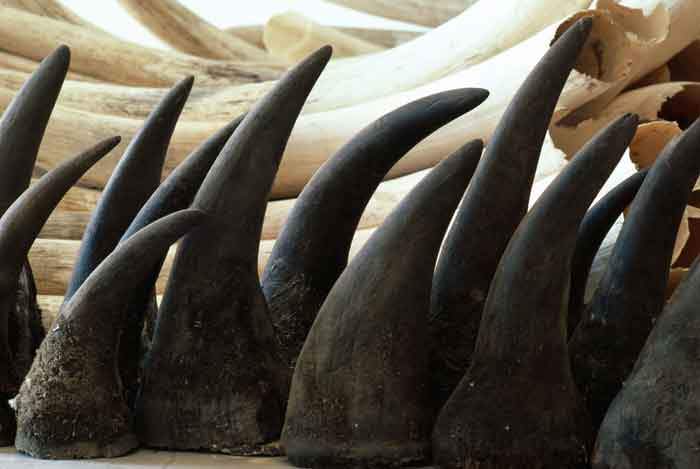
Big Joe is alleged to be what’s known as a “kingpin”. The kingpins organise rhino poaching in rural communities where the locals are desperately poor and know how to track and hunt wildlife. They sell the horn to middlemen who export the product, usually to East Asia. Here they are either made into lucky trinkets or used in traditional medicine in an attempt to cure everything from cancer to impotence.
Prosecutors allege that Big Joe has made huge profits from this trade over the years. Ansie Venter has developed a reputation as one of the most tenacious prosecutors of wildlife crimes in South Africa and she’s been trying to get Big Joe into the dock for some years. “I don’t like the publicity I get for this work but I am prepared to put up with it in order to protect the poor rhinos,” she told me.
Venter describes just how nasty these crimes are. These majestic beasts are immobilised with high-powered hunting rifles before having their horns sawn off while still alive and conscious.
They are then left to bleed slowly to death. The poachers don’t want to kill them immediately because a dead rhino will attract vultures and that in turn alerts the rangers.
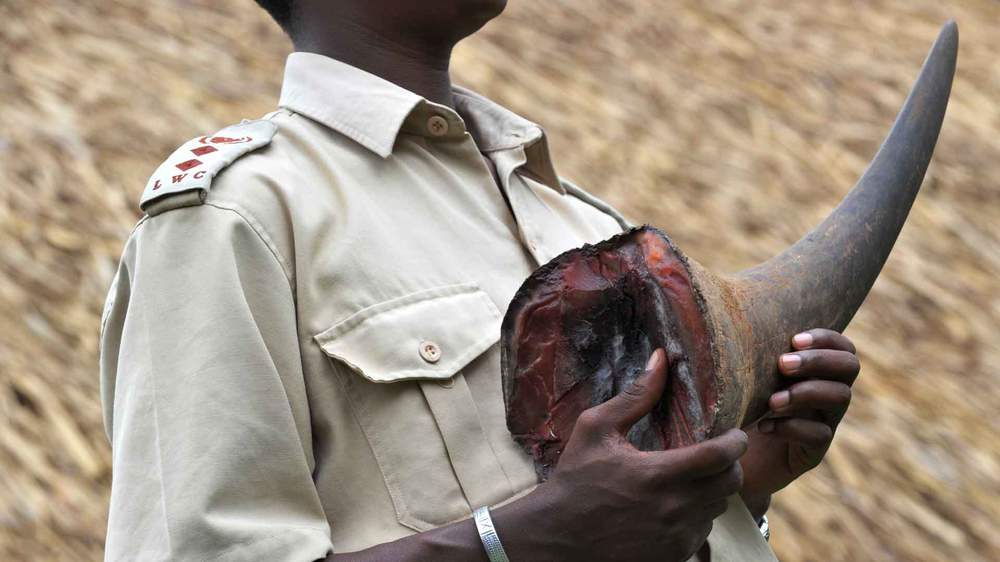
But kingpins are often regarded as Robin Hood figures by the people who work for them in South Africa, neighbouring Zimbabwe and Mozambique. The rural poor resent the fact that considerable resources go into protecting wild animals for the benefit of wealthy white tourists while their communities are left to rot.
[Poachers] are usually uneducated, poor people at the low end of the food chain who are simply desperate for an income”
Kingpins don’t have any problem recruiting from the villages around South Africa’s huge Kruger National Park where most of the big game can be found and where tourists spend thousands of pounds for the privilege of looking at them.
Venter tells me about a poacher she had prosecuted called Elliot Mzimba. Sentenced to seven years in prison, the 43-year-old father-of-six came from a part of rural Mozambique which borders the Kruger National Park. Venter says that Mzimba was typical of the kind of defendants who come before her: “They are usually uneducated, poor people at the low end of the food chain who are simply desperate for an income.”
The Kruger, which is roughly the size of Wales, has a border with Zimbabwe. The national park is also home to the largest concentration of rhinos anywhere in the world. Once the breadbasket of Africa, Zimbabwe was hit by a double whammy after the turn of the millennium.
Firstly, Robert Mugabe’s land reform programme led to the closure of many profitable commercial farms and a dramatic rise in rural unemployment. This was followed in 2008 by the global financial crash and a collapse in commodity prices on which Zimbabwe depended so heavily for foreign currency.
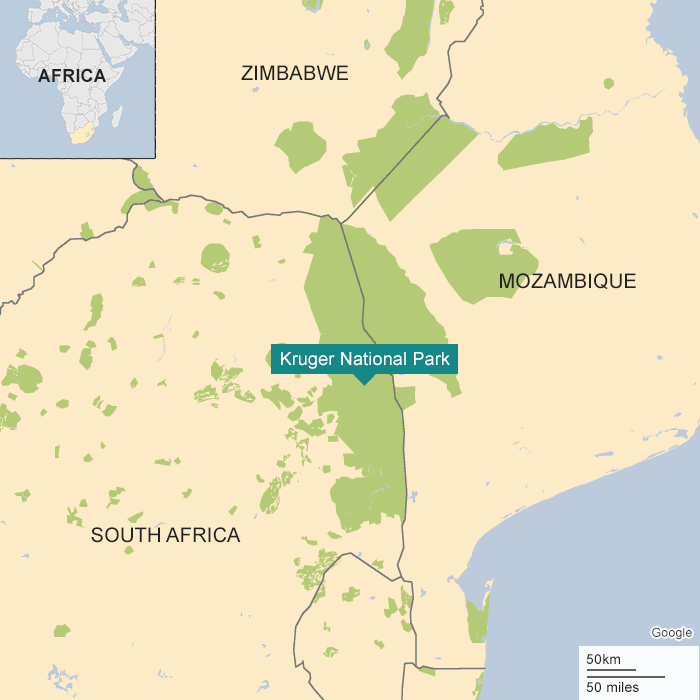
The economic chaos persuaded some Zimbabweans to turn to rhino poaching to augment their incomes. But Zimbabwe was home to relatively few of these animals. When the global crash came, Zimbabwean poachers cast their eyes over the border.
“In South Africa, the situation was quite lax,” one of the poachers explained, “so we decided to move to that side. Here in Zim the number of rhinos are low not like in South Africa.”
And the Zimbabweans weren’t the only foreigners with their eyes on South Africa’s big game. Around the same time, East Asians also started to appear in and around the Kruger.
These included not just North Korean diplomats, but even more bizarrely, Thai lap dancing girls and Vietnamese gangsters. Indeed among the people originally arrested along with Big Joe Nyalunga were two Vietnamese citizens.
For the very rich it’s still possible to legally kill big game in South Africa - including rhinos, elephants and lions - in “trophy hunts”. The traditional clients tend to be wealthy European or American middle-aged men - trophy-hunting made headlines when Minnesota dentist Walter Palmer killed Cecil the lion in Zimbabwe.
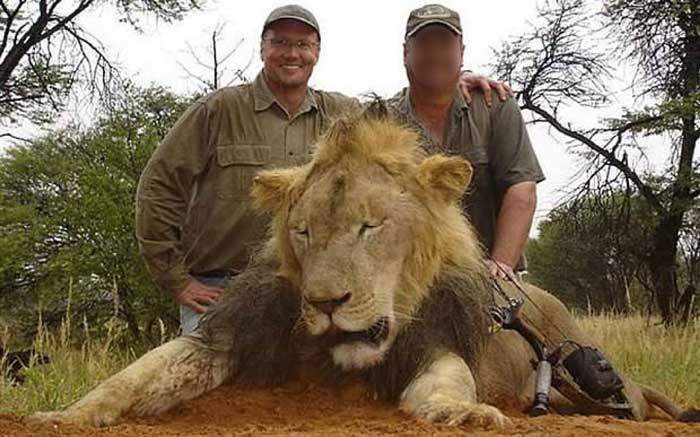
Amateur hunter Walter Palmer (l) poses with a lion (not Cecil)
But in 2006, the South African organisers of these deadly safaris noticed a new type of clientele - Vietnamese “businessmen” and, even more incongruously, young women from Thailand.
Neither the Vietnamese nor the Thais had the skills to shoot big game. Instead, they employed local marksmen to take down the beasts. The young women in skimpy safari outfits would then pose for selfies in front of the slaughtered animals.
It later transpired that the Thai women worked as dancers and sex workers in the bars of Johannesburg and were being employed by Vietnamese and Laotians for extra cash on the side. The criminologist Annette Hübschle explained that a Laotian wildlife trafficking network used a company as a front.
As a clever cost-saving measure, “the Thai representative... in South Africa recruited Thai sex workers… to accompany him and his South African intermediaries to private hunting reserves and farms to act as stand-ins for trophy hunters. The wildlife traffickers thus saved on financing travel costs from south-east Asia to South Africa,” she explained.
One former rhino trader turned whistleblower said: “The women were paid 5,000 rand (£300; $400) each for taking part in the hunt. Many of them have been trafficked to South Africa and were trying to pay off the debts that bound them to their pimps.” This intersection of two criminal trades is a common feature of the modern mafias.
Another feature of the new global mafias is that they’re multi-million dollar enterprises which are often better resourced than the law enforcement agencies charged with chasing them.
Poachers use military-style weapons, vehicles and helicopters in pursuit of elephants and rhinos, frustrating the efforts of wildlife rangers to stop them.
Khristopher Carlson, a senior researcher at the Small Arms Survey, which studies patterns of armed violence, told a UN meeting that systematic tracing of ammunition found at poaching kill sites in Africa, along with seized weapons, could help track and stop the movement of illicit weapons.
South Africa’s Kruger National Park and the private game reserves that surround it have militarised their anti-poaching units - equipping them with aircraft, drones and sophisticated weaponry.
Then there's the likes of Vetpaw (Veterans Empowered to Protect African Wildlife), an American charity which sends veterans of the wars in Iraq and Afghanistan to Africa to train anti-poaching rangers.
You can follow them on Twitter. Burly, heavily armed men in baseball caps, sunglasses and army fatigues post pictures of their captives with captions like “Gotcha!”. Some experts now fear an arms race is developing between poachers and gamekeepers.
This ramping up of responses to organised crime isn’t restricted to the rhino trade. The US-led War on Drugs has been going down this route for decades, leading to tens of thousands of deaths in countries such as Mexico, Colombia and Brazil.
More recently the European Union has sent in naval vessels to combat the people-smuggling rings based in Libya. The gangs make huge profits transporting African migrants across the Mediterranean in flimsy vessels which sink with terrible regularity.
All this reflects growing concern around the world that the culture of McMafia is flourishing as never before.
Global crime expert Tuesday Reitano has argued that this “may lock military forces into a long-term crime fighting roles for which they are ill-prepared”.
And there’s another concern - that organised crime will just corrupt key individuals in the forces fighting them.
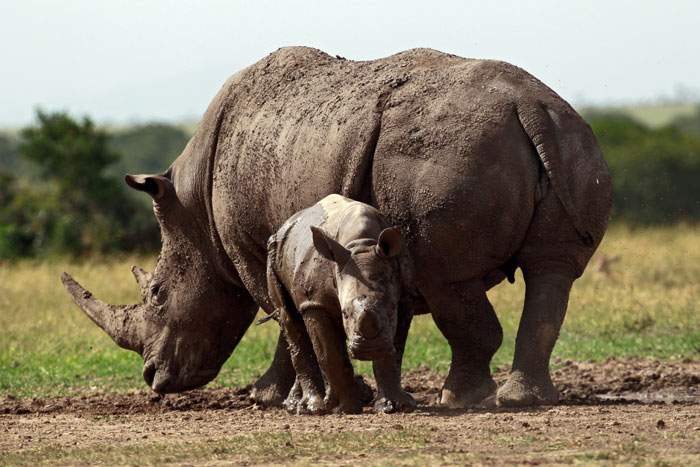
Reitano works for The Global Initiative Against Transnational Organized Crime, which is dedicated to reducing the influence of criminal gangs around the world. But she remains worried that the militarisation of the movement to protect rhinos could be backfiring.
“Weapons are proliferating across East Africa as a direct result of militarised efforts to counter elephant and rhinoceros poaching,” she said. “We need to understand and assess the possible unintended consequences of these strategies before implementing them.”
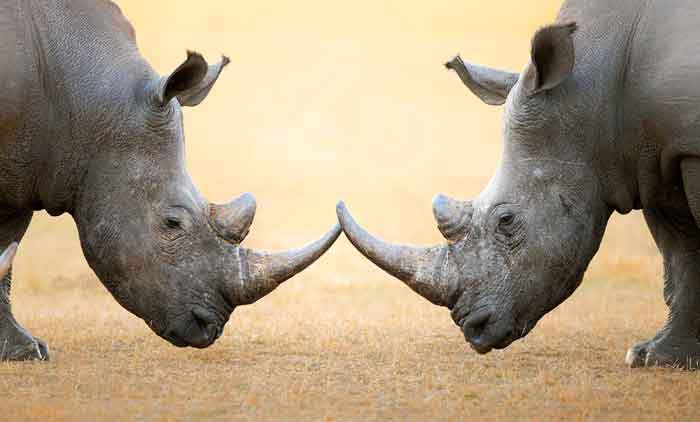
There is a growing consensus among security specialists and law enforcement officials around the world that transnational organised crime is now one of the top global threats facing us - up there with climate change, pandemics and weapons of mass destruction. But as the fate of the rhino suggests, we are long way from solving this problem.
Misha Glenny is a former ����ý journalist and author of McMafia, the non-fiction work that inspired the current ����ý One drama. The series is broadcast on Sundays at 21:00 GMT on ����ý One.
